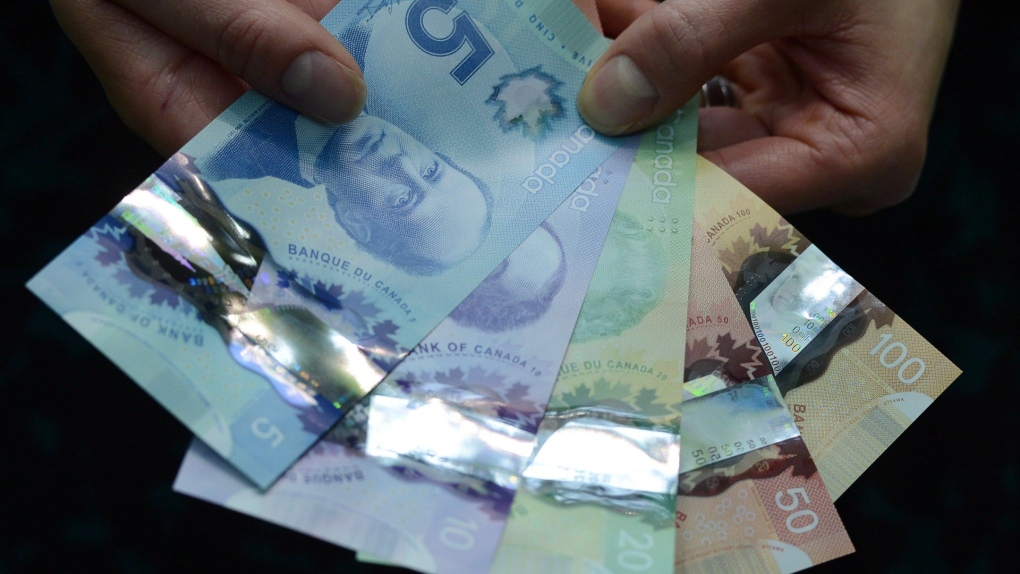52% of people in B.C. are within $200 of not being able to pay their bills: survey
 A representative with the Bank of Canada displays the new polymer $5 and $10 bank notes alongside the $20, $50, and $100 during a press conference at the Bank of Canada in Ottawa on Tuesday, April 30, 2013. THE CANADIAN PRESS/Sean Kilpatrick
A representative with the Bank of Canada displays the new polymer $5 and $10 bank notes alongside the $20, $50, and $100 during a press conference at the Bank of Canada in Ottawa on Tuesday, April 30, 2013. THE CANADIAN PRESS/Sean Kilpatrick
More than half of British Columbians say they are within $200 of not being able to make ends meet each month, according to new data.
Bankruptcy firm MNP Ltd. released its latest Consumer Debt Index this week, and it sheds some light on the impacts of inflation and rising interest rates in B.C. and beyond.
“Amid the high cost of living, households are facing a range of financial pressures, leaving minimal wiggle room within their budgets," Linda Paul, an insolvency trustee with MNP Ltd. said in a statement."
“The mounting weight of household expenses and food prices has caused British Columbians’ financial anxiety to intensify. That’s further compounded by elevated debt-servicing costs, especially for those who are heavily indebted.”
The percentage of people who reported being within $200 of not being able to pay their bills has jumped to 52, up eight points from last quarter – the largest increase among all provinces.
This increase comes as the average British Columbian, according to MNP, is shelling out $206 more per month on essentials when compared to last year.
“While households are trying to curtail discretionary expenses and spend more cautiously, some have exhausted all possibilities of cutting back. They’ve already swapped to the cheapest grocery store items and cut down on their entertainment costs. Despite these measures, they’re still struggling with the essentials like putting food on the table or paying their mortgage or rent,” Paul wrote in the media release.
“That leaves individuals with difficult choices around which bills to prioritize and which they may have to postpone or forgo.”
Perhaps unsurprisingly, 49 per cent of people surveyed say they regret taking on debt and worry about repaying it. This also represents an increase form last quarter.
When it comes to the impact of interest rates, 68 per cent say they are feeling the impact of higher rates and 60 per cent say the increase has made them more concerned about paying their debts.
Nationwide, MNP found the percentage of people who reported being unable to meet all of their financial obligations rose to 35 per cent – the highest that has been recorded in the five years the index has existed.
CTVNews.ca Top Stories

N.Y. prosecutors charge Luigi Mangione with murder of UnitedHealthcare CEO, court records show
Late Monday, Manhattan prosecutors filed murder and other charges against Luigi Nicholas Mangione in the killing of UnitedHealthcare's CEO, according to an online court docket.
Union dropped wage demand to 19% over four years in Canada Post negotiations: CUPW
The Canadian Union of Postal Workers (CUPW) has reportedly dropped its wage demand to 19 per cent over four years, CUPW negotiator Jim Gallant told CTV News.
Taxpayer-funded Eras Tour tickets returned by federal minister
While tens of thousands of fans packed Vancouver's BC Place for the last shows of Taylor Swift's Eras Tour this weekend, a federal cabinet minister wasn't one of them.
Sudbury, Ont., family traumatized after hospital said loved one had been released, when in fact they had passed away
Sudbury resident Angela Vitiello says a staff member at Health Sciences North told her that her brother, Allan St. Martin, was released from the hospital late last month when, in fact, he had passed away.
What the upcoming holiday GST relief will mean for consumers
The federal government's GST break will arrive this Saturday, just in time for the last stretch of holiday shopping.
Liberal government survives third Conservative non-confidence vote
Conservative Leader Pierre Poilievre's latest attempt to topple the minority Liberal government in a non-confidence vote failed on Monday, thanks to the New Democrats.
Katie Holmes refutes story about daughter Suri Cruise’s fortune
Katie Holmes has posted a screen grab of a Daily Mail article, which reported that her 18-year old daughter, whose father is Tom Cruise, is now a "millionaire."
Polygamous U.S. sect leader gets 50 years in prison in scheme to orchestrate sex involving children
A polygamist religious leader in the U.S. who claimed more than 20 spiritual “wives” including 10 underage girls was sentenced to 50 years in prison on Monday.
Trudeau says dealing with Trump will be 'a little more challenging' than last time
Prime Minister Justin Trudeau said dealing with incoming president Donald Trump and his thundering on trade will be 'a little more challenging' than the last time.

































